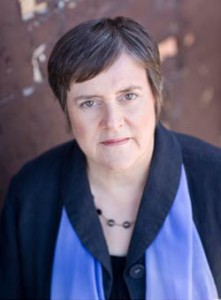
Photo by Callie Lipkin
This is part two of an interview with award-winning author and poet Kathleen Norris, which was conducted in April 2017. Click here to read part one of the interview.
On the Saint John Abbey’s Oblate website, they cite the publication of The Cloister Walk, which you wrote partially at the Collegeville Institute, as the source of a surge of new Oblates. The monks began to joke about it, calling it “The Cloister Walk effect.”
A nun who was commissioned to do a study of Oblates used a survey that covered a large number of Oblates across America. When she presented the results of her results she included a graph of the inquiries about Oblates over time. All of a sudden in 1997, it went up, which is the year that The Cloister Walk was published. The inquiries skyrocketed.
I was amazed. When you’re writing a book you’re wondering, “Is anybody going to read this at all? Is anybody going to be interested?” A dramatic rise in Oblates is nothing I had in mind, nothing I could have foreseen or anticipated or certainly nothing I aimed to accomplish. I was just telling stories about nuns and monks. These monastic folks are hidden in plain sight and people don’t really know much about them, and what they do know tends to be romanticized. I said, “No, let’s set the record straight. Let’s tell some stories about monks making omelets.”
What was that like to have that level of success?
Dakota was the first. They initially published 8,500 copies. They ended up having to print 200,000, which was huge for a book like that. It’s still amazing to me. I’m grateful it happened after I had already been writing for 20 years. Since I wasn’t an overnight success it was easier to handle it. I was living out in this little town in South Dakota where people are much more interested in the price of feed and cattle than what I was doing. Also the monks made it their concern to keep me humble.
My agent, who was in New York City, said, “You don’t know how lucky you are,” referring to my relatively remote position in South Dakota. Had I been living in New York City success would have been harder to deal with. I would have had to cope with professional jealousy from other writers, and all kinds of pressures that I just didn’t have to face, because I was spending my time in South Dakota and the monastery. In both places there were other things that were more important than the success of my book.
The only major change is that we had to connect an answering machine to our phone, and never just pick up a ringing phone because sometimes it would be fans who had tracked me down. Sometimes they were a little weird—one asked me to perform a wedding ceremony. I received a lot of fan mail, which is now in my archive at South Dakota State University; I got beautiful letters about that book. I still get some, and they all end up in the archive. I tried not to let the attention change things too much.
The Benedictine perspective on things helped a lot: you’re not the center of attention, you’re answering your call. You’re doing what you’re called to do, and you’re not that big of a deal. The call is the big deal.
Has the idea of calling in your life changed as you’ve gotten older and had these successes? Do you think that you have a new calling for the stage of your life you’re in now?
The calling to be a writer has been there for a very long time. That’s where my stability is; it’s in knowing that I’m going to put stories together and write them and put them out in the world. The calling to be a Benedictine Oblate came later. Although, it has been 30 years now, so, that’s pretty stable, too.

The way I know that I’ve got some stability in both vocations is when I have a significant setback. Recently, I’ve had a setback connected with something that I really wanted to write about. The key people I trust, my agent and my manager, said it wasn’t going to fly. It wasn’t working.
Instead of getting hysterical, I respected their opinion, and listened to it. I know they’re right, and I know this isn’t the end of the road. It hurt my feelings when I got these responses that I wasn’t expecting. I was deeply disappointed. But, instead of getting depressed, and wrapped up in “what ifs,” I can look at the situation in perspective. If I hadn’t had years of being a Benedictine Oblate, I don’t think I could do that. I wouldn’t have the resources to cope with that level of disappointment and move on to a new project.
Now, a whole new path is opening up. I have started writing a book about my sister titled Rebecca Sue. [Short excerpts from the upcoming book are posted here on Kathleen Norris’ Facebook page.] The other book will sit on the back burner and it still matters a lot to me. But it isn’t a book yet. My advisers were right. If it’s meant to be, God will open a path for it. Right now I can set it aside.
Benedictine humility really does stabilize you. I don’t know everything. Even in a severe disappointment you recognize that God hasn’t abandoned you. You have faith that God will open up another path for you, even when you can’t see, or even imagine, where it might be.
Speaking of the Benedictine call to stability, I wonder how you uphold that call while being part of different faith communities. You are someone who goes to an Episcopal church in Hawaii, a Presbyterian church in South Dakota, and you’re a Benedictine Oblate at a Roman Catholic monastery.
I believe the call to stability includes a call to being ecumenical, and great ecumenical exchange is possible when people feel secure in their own tradition, or maybe traditions. You can hear someone else, and still not hesitate to articulate what you believe clearly. Maybe I’m a little odd, though. But, the Collegeville Institute is a place where misfits fit and feel free to talk with others.
When I was deciding whether to be an Oblate, I was actually deciding if I belonged in the Christian tradition at all. At that time I wasn’t sure if I was a Christian. I had a lot of doubts. It’s ironic because, once I knew that I wanted to be an Oblate and I wanted to continue going to the Abbey for the liturgy, I realized I had to join a local protestant church, too. My grandparents had been members of their church for over 60 years and I had gone to Sunday School there in the summers when I was a kid. That little Presbyterian church in South Dakota seemed to be the logical choice for me to join because I needed a community beyond the monastery that was closer to where I lived. So in one crazy year I joined a protestant church and became a Benedictine Oblate at the same time. Somehow the two came together for me.
Benedictines predate the major splits in the church. Their monasteries were around long before there were Orthodox and Catholic and Protestant traditions to choose from. The Benedictines provide a template of the faith that’s open to any Christian—in that sense Benedictines are a point of stability for all Christians. They certainly are for me. I think that one of the reasons why so many Protestants are drawn to the Benedictines and monasticism now is because they make that connection.
Do you have any advice for writers writing spiritual nonfiction or memoir?
When somebody is telling a really personal story—maybe writing memoir—it’s important that they have the reader in mind. Then, they’re not just writing about themselves for themselves. Without that constant awareness of the reader with whom you’re trying to communicate, a self absorption can creep into memoir writing that is sometimes so blatant that you just don’t want to read anymore.
Writers need to ask: “Who am I writing for? I’m not writing for myself. I’m not even writing about myself.” Even very personal writing needs some broader perspective. That’s one of the reasons that, even though I’m writing memoir, I’m trying to write about bigger issues. I use a lot of personal stories about myself, but also about other people and about the Benedictines. I also quote other people a lot. Amazing Grace was basically about the vocabulary of the Christian faith. It wasn’t just about me.
It sounds like the incorporating research plays a part in writing for a broader audience.
I’ve always been willing to do research precisely because I want to write about something bigger than myself. When I wrote about Benedictines I did research on Benedictines. When the narcissism reaches into writing it’s really easy to spot.
How do you spot when a writer, or your own writing, becomes self-absorbed?
You have to learn to read your own writing from a distance. When you read your own work, or someone else’s, and realize you’re not invited in as a reader, it’s a pretty good sign that the writer is hogging all the attention. Even if it’s an interesting situation or story, I cannot keep reading if everything is referring back to the author.
One of the things I look for in my work is how many times I use the words “I” and “me.” I don’t always need to talk about how something affects me. I just need to tell the story. It’s amazing how even a little technique like that helps.
This is part two of Stina Kielsmeier-Cook’s interview with Kathleen Norris. Click here to read part one.
Like this post? Subscribe to have new posts sent to you by email the same day they are posted.



My Uncles were monks at St John’s University in Collegeville, MN. I was born and spent 26 years in St Cloud, MN. Went to midnight mass on x-mas eve many times at the Abbey.
How could I get a free copy of any/or all of your books?